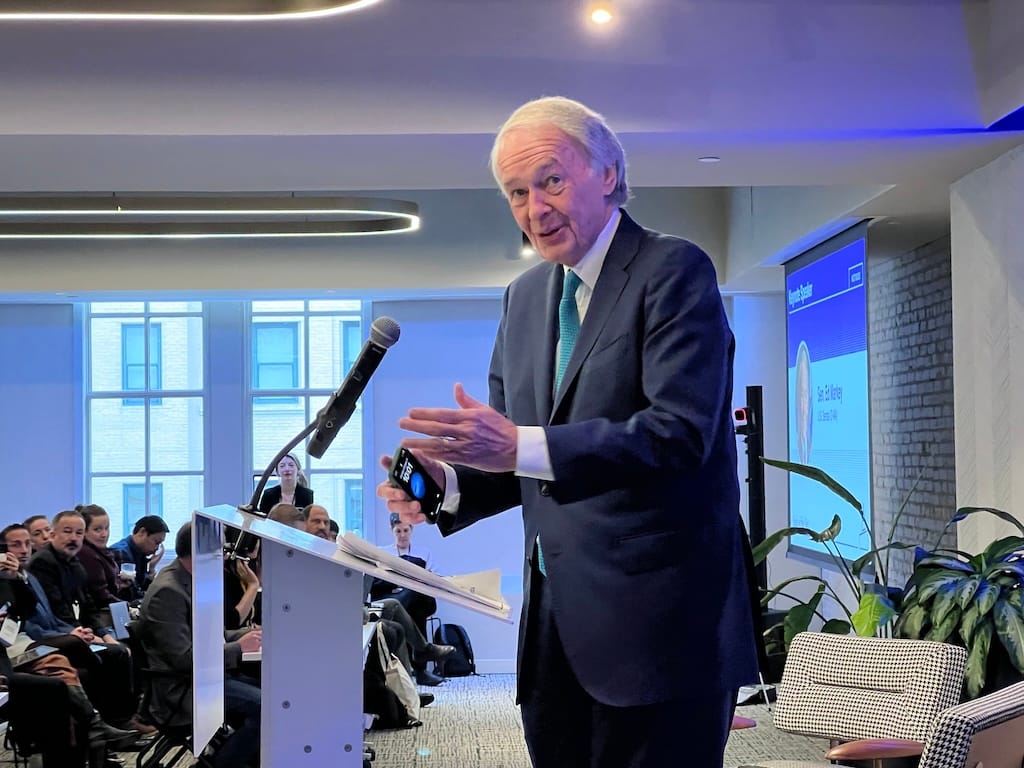Sen. Markey Warns of Authoritarian and Corporate Threats to Internet Freedom
‘Don’t be fooled,’ Markey said: Trump’s 'free speech' crusade is actually a campaign for more censorship.
Jericho Casper

WASHINGTON, Feb. 11, 2025 – For decades, Sen. Ed Markey, D-Mass., has championed policies that he believes will keep the Internet free and open. But on Tuesday, he warned that the digital world stands at a dangerous crossroads.
“Today, we are at an inflection point for the Internet – a moment that will define whether the Internet can serve as a tool for empowerment and creativity and truth, or whether it is co-opted by authoritarian forces, corporate monopolies and artificial intelligence systems that put profits and corporate power over people,” Markey said, delivering a keynote at the State of the Net 2025 here in Washington, D.C.
“Trump administration officials have made regulating the speech of online platforms one of their top priorities,” Markey said. “They claim to be waging a campaign against censorship. Don’t be fooled. It’s really a campaign of censorship.”
Markey identified three primary threats to the future of the Internet: 1) political manipulation of content moderation; 2) the dismantling of net neutrality; and 3) artificial intelligence reinforcing the dominance of a few tech oligarchs.
He warned against what he described as an authoritarian push to control online discourse. “The Trump administration is waging a relentless war on online speech and independent journalism,” Markey said. “Pressur[ing] Big Tech platforms to adopt content moderation policies that promote conservative viewpoints.”
Markey’s concerns come as Big Tech faces mounting political pressure to reshape content moderation policies. Meta’s decision to scale back its misinformation and election integrity efforts ahead of Trump’s campaign heightened fears that tech platforms were increasingly bending to partisan demands.
Markey took direct aim at Silicon Valley leaders, arguing that they have become complicit in this effort.
“Just look at where Big Tech oligarchs sat at the inauguration. They sat in front of Trump’s cabinet,” he said. “Tech oligarchs cozying up to an authoritarian president is a dangerous combination, both for the free and open Internet and for our democracy.”
Markey lamented that the original vision of a free and open Internet had eroded over the last 15 years under “an Internet shaped by corporate consolidation and a business model that prioritizes profit over public interest.”
He stressed that the Sixth Circuit Court of Appeals' January decision to overturn net neutrality protections has further consolidated control over Internet access in the hands of a few powerful corporations, undoing what he called “common sense” safeguards for consumers and competition.
“Without net neutrality, consumers, small businesses and innovators alike will face increased costs, reduced choice and less competition,” he said. “It is a lose, lose, lose.”
Markey also warned that AI threatened to reinforce monopolistic power. “Big Tech threatens to become Big AI,” Markey said, warning that the same companies that dominate today’s Internet were poised to control the future of artificial intelligence.
Despite the challenges, Markey struck an optimistic tone, insisting that the fight for a free and open Internet was not yet lost. He pointed to growing public awareness, bipartisan concerns over tech monopolies, and renewed efforts to pass privacy and competition laws as signs that change was possible.
“We can rebuild the Internet — not as a tool for billionaires and autocrats, but as a public good for all,” he said. “The Internet was meant to be free and fair and open. If we choose to fight for it, it can be that way again.”









Member discussion